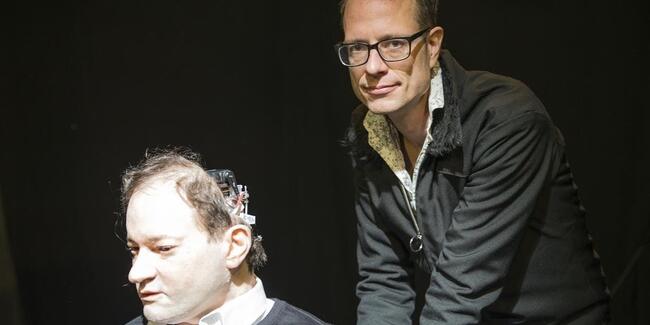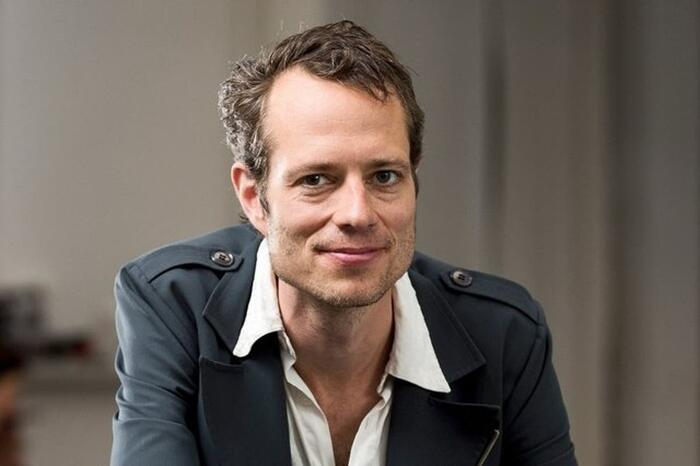
18 May ‘I AM NOT A ROBOT’ AT THE UNCANNY VALLEY
The guest of the online program of Kundura Stage (Kundura Sahne located in Istanbul, at the Beykoz Kundura) is Stefan Kaegi, one of the founders of Rimini Protokoll which is one of the important art collectives of the European Theater. The guests of his project called “Uncanny Valley” are German writer Thomas Melle, more precisely, Melle’s copied and produced android along with the British mathematician and computer scientist Alan Turing.
After saying “By the late twentieth century, our time, a mythic time, we are all chimeras, theorized and fabricated hybrids of machine and organism; in short, we are cyborgs”, the author of the book “Manifesto Cyborg”, in her book “The Companion Species Manifesto” Donna Haraway continues as: “This is also a tale of biopower and biosociality as it is a tale of technoscience. / Cyborgs (…) may be the figurines of surviving in the heart of contradiction.” “Cyborg”, “uncanny valley”, “android”, “actroid”, “robot” or “transhuman”, what is the definition and meaning of all these names/definitions for you (in your perception)?
It’s funny you quote Haraway. As you know she also is very intrigued by animals intelligence – and I am just working with a very smart Octopus as protagonist of my show. And when we look at it it feels so alien that people like Vilem Flusser called them extraterrestrian. Cyborgs on the other hand are very familiar tot us. We are so closely connected to and even dependent on technology that it hurts, when we lose them. Try to lock away your mobile phone for a day and you will feel the phantom pain…
Let’s talk about “Uncanny Valley” performance… Can you tell us about the theme and the creation process of this performance? What was your source of inspiration? How did Stefan Kaegi, Thomas Melle and Alan Turing get together?
I was fascinated by some humanoids I saw in museums but felt the power of an encounter in theatre where you are exposed to the robot as a performer could be way stronger. At some point I came across Thomas’s book ‘The World in my Back’ and I suspected that he could have an interest in replacing himself to avoid instabilities resulting from his bipolarity. Thomas quite immediately was inspired by the robot idea… And he suggested to add a part about Alan Turing – which I liked very much…The inside of the robot was created by Chris-Creatures a small animatronics workshop in Berlin. They built the entire exosceleton and installed the 32 servo engines while the silicon skin and the hairs and hands were produced in the mask workshop of Kammerspiele München. Indeed to make him walk would have been an entirely different story. Luckily for the purpose of a lecture performance in a theatre space we didn’t need those features.

Nowadays “Uncanny Valley” is a frequently used concept. Culture and art also get their share from such use; it appears in cinema, exhibitions, literature and music. It is both entertaining and uncanny to watch the projection of this concept that has been used by Japanese robotist Masahiro Mori in the 70s, onto today’s setting every day. As of today, it is obvious that technology has changed our world; how do you think such change modified and transformed creators of culture and art/you and their followers/us? For example, how will it be to make art in an “uncanny valley”?
More and more, we are treated by bots. Somebody may have even written an algorithm that answers this kind of interviews and it would be hard to prove it wasn’t me answering your questions.
But I wondered if people can empathize with a thing. A classical theatre question applied on a simulation of an actor.
We probably all try to make us more efficient, less fragile. We want to forget less and live longer. And we all rely on technics and medicine to move further down that alley. Now where is the limit?
I would like to ask the questions stated in the introduction text of the play to you, you can reply each of them with one sentence: What does it mean for the original when the copy takes over? Does the original get to know himself better through his electronic double? Do the copy and his original compete or do they help each other?
I prefer not to answer the questions raised by the piece, I hope the play inspires each spectator to answer them for themselves. But what I can say is that the process of creating this human copy helped all of us in this process to look more precisely at the human being. I guess a similar thing happens to painters when they try to paint the human body. They start to look very precisely at the original. For me this piece is about empathy because we cannot stop ourselves feeling empathy with this machine as we mirror ourselves in him (or it?). And precisely this empathy-mechanism in us is one of many human “programmes“ that make me doubt where the limit between a robot is and ourselves. How free is our free will?
Jacques Derrida, who said “This world is a manuscript of another world closed to a universal reading and code of which can only be deciphered by existence” in his book “Gramatologia”, and Raymond Williams who said “Human is not anything due to its “nature”. It is an entity that both creates and overcomes its boundaries” in “Modern Tragedy”. Under the light of these masters’ quotes, how will the pandemic process we are going through globally, transform performance arts and the lives of humans in the future? Or do you think the 350 thousand years old story of the humanlings within the 4.5 billion years old history of the earth would continue as it has been all these years?
Certainly the humans are weared kind of animal. They somehow have lost their instruction manual, their instincts. After having outsourced all they used to do – either to machines or to countries where labour is cheap enough you can afford it, they don’t know further what to do. I guess it’s a good moment to look at nature, as some of it will go on. The pandemic is certainly a good moment to ask ourselves how long we want to live and reproduce ourselves. A good moment to question growth, both economical as well as growth of population, prolongation of our life expectancy etc.
Are there any more projects and plays on the way? It would be nice to give the good news from here!
My octopus piece is finished,waiting for it’s audience. It’s recording will actually be streamed in an online version by Theatre Vidy-Lausanne this week. I created an audio-tour for abandoned theatres during lockdown: Black Box, Phantomtheatre for 1 person. With my Rimini Protokoll colleagues Helgard Haug and Daniel Wetzel, we created a live-zoom-performance-version of our Call Centre piece Call Cutta. And we are working on a big immersive exhibition for the CCCB museum in Barcelona…And for Turkey I really hope that soon our Remote Istanbul audio-tour will soon be running again.
Betül Memiş / CNNturk.com
Source


